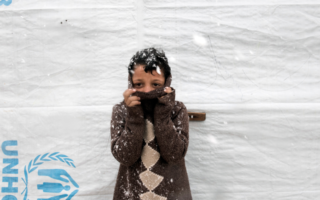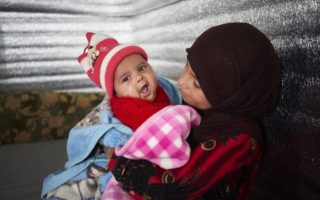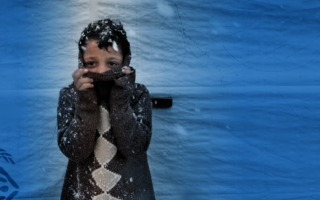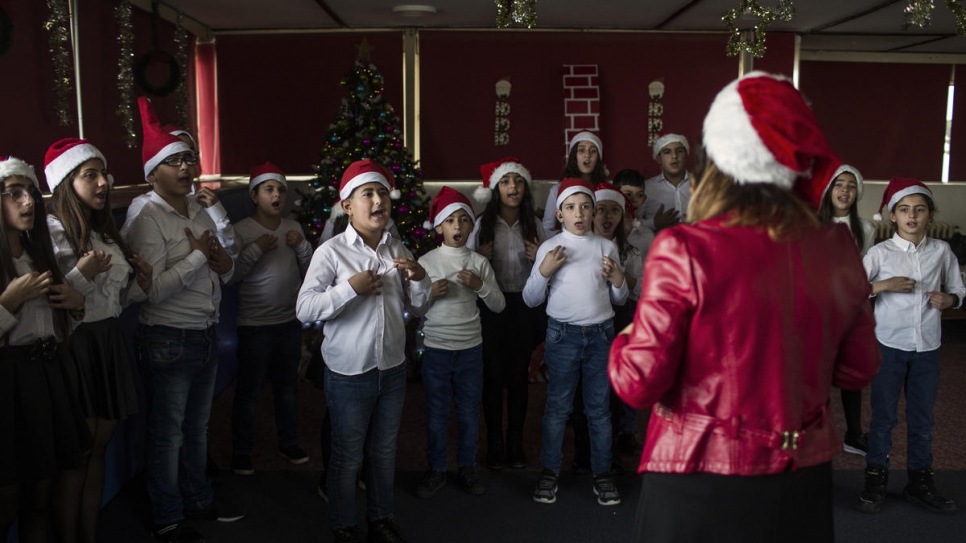
Children sing in the Christmas choir at the FAID, which welcomes Lebanese and Syrian youngsters with hearing disabilities from different religious backgrounds. © UNHCR/@Diego Ibarra Sanchez
In Lebanon, refugee choir featuring deaf Syrian children and locals and a 160-strong ensemble including refugee performers help to spread some seasonal cheer.
With their hands signing the words and music connected to their ears through cochlear implants, a group of Lebanese and Syrian children decked out in white shirts and Santa hats heartily perform the carols they have learnt as part of Lebanon’s first-ever Christmas choir by the deaf.
Cochlear implants make music sound very different. Researchers liken the experience to being underwater or in a tunnel. But these Lebanese and Syrian refugee children have stepped up to the challenge.
With melodies emerging from their devices and lyrics memorized by heart, the kids have spent almost six months practicing three popular Christmas songs: Joy to the World, Jingle Bells and Silent Night. All their efforts have ensured that, remarkably, they are able to sing together in rhythm and harmony.
‘’I am very proud of them. They are singing a melody they can’t even hear properly.”
The choir is made up of 26 Lebanese and Syrian refugee children aged between four and 16 years. They perform under the supervision of conductor Pascal Khairallah, the artistic director of FAID, the Father Andeweg Institute for the Deaf, located on the outskirts of Beirut.
The children had to divide every word into letters to be able to pronounce the lyrics accurately. The outcome is nothing short of miraculous, said Khairallah.
‘’I am very proud of them. They are singing a melody they can’t even hear properly. It is like asking blind people to colour something they can’t see … so it is a great thing they are able to do it.’’
Nine-year-old Ali from Damascus is among the seven Syrian refugee children performing in the choir. Born with a hearing impairment, Ali learned how to use his voice for the first time when he joined the school in 2012 and began wearing a hearing aid.
“I am happy to sing together with other children,” said Ali, whose favourite Christmas song is Silent Night.
Anxious to ensure that their performance was accessible to all who come to see it, the children insisted on performing one song with sign language.
“They asked to do one song in sign language, because they said: ‘What if a deaf person is watching us? We want to explain to them what we are singing’.”
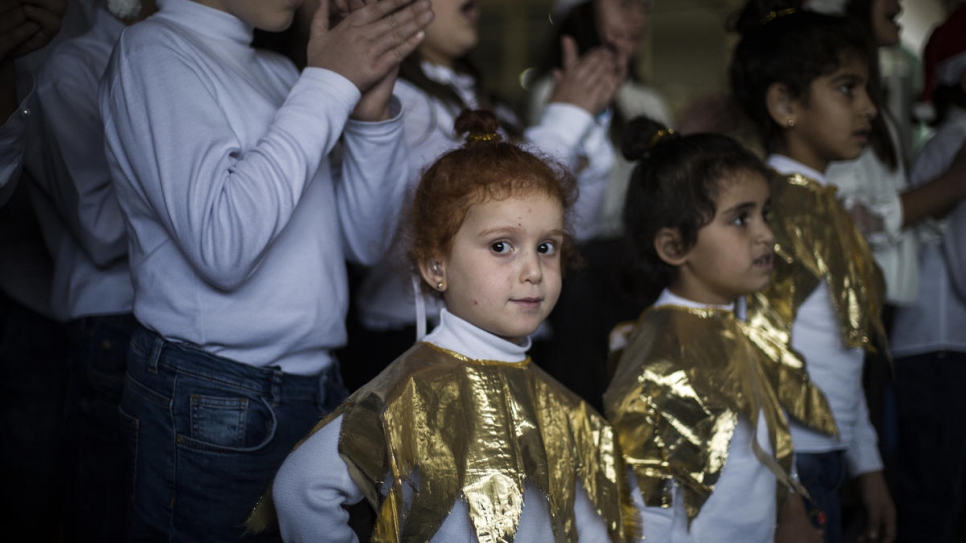
Four-year-old Maysa El Kheiry escaped the war in Syria in 2016. Two years later, she enrolled in the Father Andeweg Institute for the Deaf (FAID) school where she sings in the choir. © UNHCR/@Diego Ibarra Sanchez
Founded in 1957 by Father Andy Andeweg, a Dutch Anglican priest who passed away in 1999, FAID is one of a handful of establishments in Lebanon that offers specialist speech and auditory therapy. It welcomes Lebanese and Syrian children aged 3-18 with hearing disabilities, from different religious backgrounds. UNHCR, the UN Refugee Agency, supports the school.
“UNHCR supported Syrian refugee children at the school last year. This year they were able to support more. There are twenty-four Syrian refugee children supported by UNHCR,” said Gladys Shawich, fundraising manager at FAID.
The children of FAID are hoping to perform their songs to wider audiences next year, to demonstrate their resilience and show music as a universal language for all. For now, they hope to spread joy to the world through their voices to as many people as possible.
“I want to wish everyone a Merry Christmas and a happy New Year,” said Ali.
Earlier this month, Lebanon – which currently hosts more than 950,000 registered Syrian refugees – played host to another Christmas choir featuring refugee performers.
In the northern city of Tripoli, more than 160 singers including persons with disabilities as well as Syrian, Iraqi and Palestinian refugees came together for a performance designed to spread a message of peace and unity.
“The pain of displacement and the hardship I went through, I wanted to let it out in a beautiful way.”
A local NGO approached UNHCR in early November looking for talented singers among the refugee community. “The idea was to be inclusive of everyone,” said Wafaa Khoury, the event organizer. “We want to live up to our humanity, to show that no geography, no language, no disability can stand between us as humans, God created us all equal.”
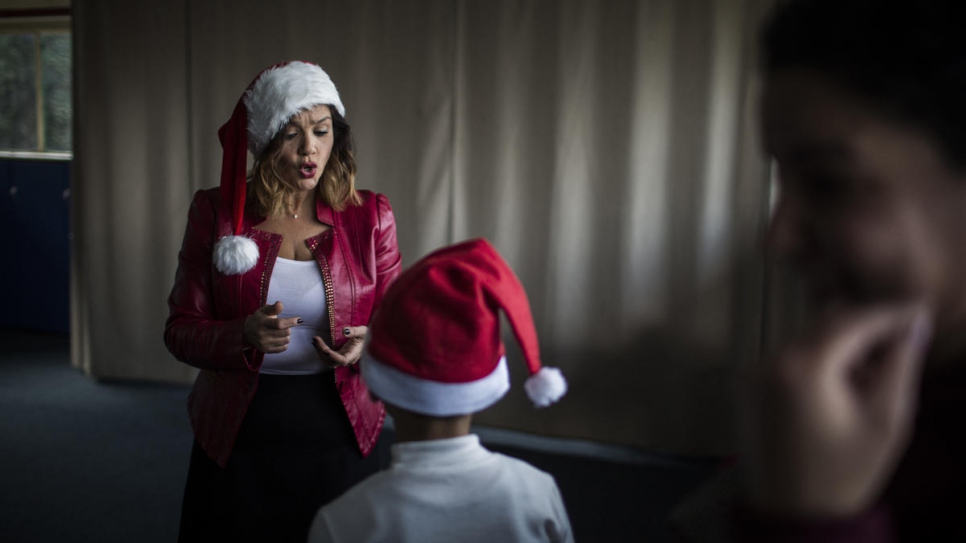
Teacher Pascal Khairallah leads Ali during choir practice at FAID. © UNHCR/@Diego Ibarra Sanchez
One of the performers was 18-year-old Sedra, from Idlib in Syria. She fled to Lebanon with her family two years ago, and began singing as a way to channel her emotions. “The pain inside of me, the pain of displacement and the hardship I went through, I wanted to let it out in a beautiful way that helps me get rid of this pain,” she explained.
Theresa, 16, is an Iraqi refugee from Qaraqosh, near Mosul. She said that during the past three years in exile, Christmas was often a painful reminder of home and happier times, until she joined the choir this year. “The choir made me forget the pain of exile. Here, hand in hand, singing together, we feel happiness and peace.”



